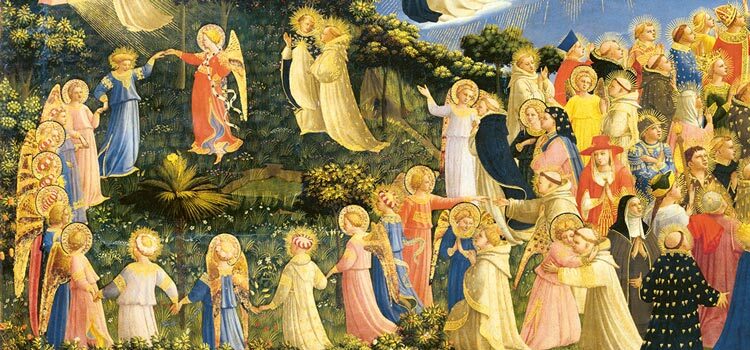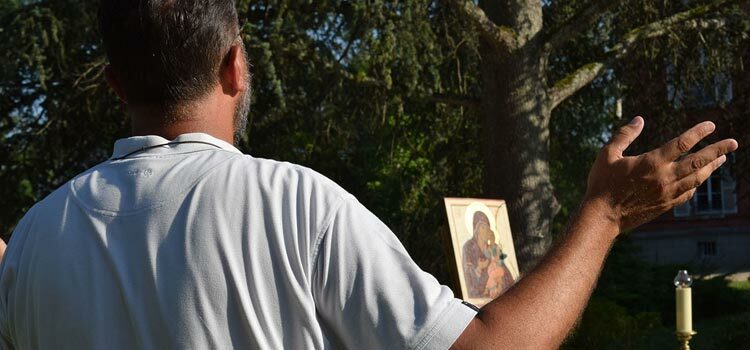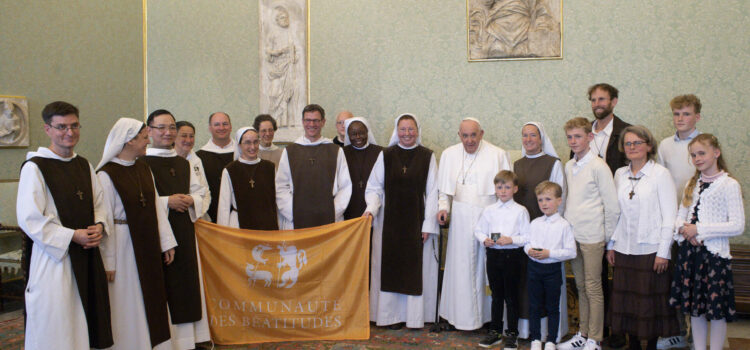« I want to see God » exclaims St Teresa of Avila. A burning and unquenchable desire dwells in her heart, so much so that her quest will have no respite, through the school of orison, until it reaches the ultimate (eschaton). St Paul evokes the quest of the baptized : « And we all, whose faces reflect the glory of the Lord, are transfigured into that same image, with an ever greater glory by the Lord, who is the Spirit » (2 Cor 3 : 18)
Every Christian, through baptism, is already risen with Christ and can exclaim with Job :
“After this skin of mine is destroyed, I will see God in my flesh. It is I who will contemplate him, yes, me ! My eyes will see him, and he will not be a stranger. My heart burns for him within me. » (Job 19 : 26-27). This burning desire also inhabits our liturgies, for instance the Collect for the Mass of the Feast of St Clare, which ends with the words « Grant that we may follow Christ with the same poverty of heart, so that we may be able to contemplate you in the Kingdom of Heaven. »
The purpose of orison
If « the goal of a Christian life is the acquisition of the Holy Spirit » according to the monk St Seraphim, it is good, already on this earth, to seek to contemplate by faith, the invisible mysteries which will be fully revealed to us in Heaven, in joy and light. Our vocation of prayer has its source in the mystery of Transfiguration (cf. our Book of Life). Our effort, to follow Christ, the Word turned towards the Father, is to climb the mountain where, like Moses, Elijah and the apostles, we will be seized by the uncreated light and where it is given to us, by pure grace, to “see what the eye cannot see and hear what the ear cannot hear” (1 Cor 2 : 9). We certainly would wish to with a view stay in this moment of happiness, of pure spiritual joy! If it is good to taste these moments of pure grace, it is undoubtedly with a view to continue the road, often arid and deserted, and keep courage to go to the end and see his Face.
Contemplation
The regular practice of orison aims at this union. Orison of recollection and infused contemplation disposes the soul to this benefit. This simple and uncluttered practice is that of a determined and persevering theological life which is strengthened in poverty of heart and in unceasingly renewed conversion, according to the teachings of Saint John of the Cross.
For him, as long as the soul remains in this recollection and passive night of the senses, it progresses through faith « acting in charity » (Ga 5 : 6) . The heart becomes more and more inflamed with love and desire for the Beloved. The powers of the soul are themselves progressively captivated in God. A simple glance, a motion of the heart, as St Therese of the Child Jesus testifies, is enough for the person praying to be captivated in God. Then St Paul’s experience becomes ours « It is no longer I who live but Christ who lives in me » (Ga.2,20) The person is then available to the divine goodwill that can introduce him by pure grace, to “see what the eye cannot see and hear what the ear cannot hear” (1 Cor 2 : 9). This person is then available to the divine good will which can introduce her in the intimacy of this « devouring fire » (He.12,29).
Paradoxically, this grace of contemplation can hold the soul, here on earth, in deep joy and peace and at the same time, keep it in darkness, in an obscure dark night, even with the feeling of God’s absence. At other times, the Lord seems to open, in the midst of the clouds, a window on Heaven, to give a glimmer of light, that gives the intelligence a grasp of the divine mystery and its plans. Thérèse de Lisieux goes so far as to say : « Our Lord, in the Garden of Olives, enjoyed all the delights of the Trinity and yet his agony was no less cruel. It is a mystery but I assure you I understand something of it by what I myself experience » (quoted by St John Paul II in Novo Millennio Ineunte n° 27).
The Orientals call it painful joy. In any case, the human will is more and more firmly established in God, to the point that it becomes as God’s own and that « nothing can now separate it from God’s love » (Rom.8,39).
A work of the Holy Spirit
The great Master of orison and a fortiori of contemplative prayer, is the Holy Spirit. As for us, we can only dispose ourselves to seek only the good pleasure of God. As St Bernard writes : « Love, who is the Bridegroom, awaits only reciprocal love and faithfulness. How could the bride not love, since she is the bride of Love (…) to devote herself solely and entirely to love ? ( … ) What a great thing love is, if at least it flows back to its source to draw from it a continual gush (…) That is why to love in this way is a wedding ». (Homily on the Song of Songs)
Let us pray to the Holy Spirit to make us desire the One who desires us much more strongly than we desire ourselves.
Its fruits
John of the Cross says that if the spiritual person rises to God beyond sensitive goods, it is because he is « nourished » by the Spirit of God who fills him and raises him to Him. So he can taste the goodness of this divine friendship, the fruits of love, the delights of his tenderness.What gives strength to this shared friendship is the silence in which contemplative life is nourished by the Trinitarian life it receives according to divine Wisdom, beyond any representation. Penetrated by divine lights, intelligence opened up by the Spirit receives divine favors, inspirations and charisms, as shown in the life of the saints.
Of course, we must remain prudent and humble, « looking to Jesus, the author and perfecter of our faith » (He .12,2). Because orison and contemplative life open onto the world to come, but we are still only on the way and we continue to long for the fulfillment of our desire. Only strong and pure desires (cf. orison for Advent) enable us to long for eschatological goods.The world is waiting for genuine contemplative praying people who show it the way to the Kingdom : « … when He appears, we shall be like Him because we shall see Him as He is » (1 Jn 3,2).
Quote
« All movement ceases, prayer itself changes its nature : « The soul prays outside of prayer » (St Isaac the Syrian). It is hesychia, the silence of the spirit, its rest which is above all orison. Peace which surpasses all peace. It is already the face-to-face extended to eternity, when, according the beautiful words of St John Damascene « God comes into the soul and the soul emigrates into God ». Paul Evdokimov
St Augustin’s testimont in the Confessions
She and I (St Monique and St Augustin) were alone, leaning against a window from which we could see the garden, in the house we lived in. It was in Ostia, at the mouth of the Tiber. Far from the crowd, after the weariness of a long journey, we were regaining strength for the crossing. We were alone, talking quietly, with a great sweetness. Forgetting the past and looking to the future, we sought together, near the Truth, that is to say near you, what would be the eternal life of the saints that no eye has seen, no ear has heard and the heart cannot conceive. Our hearts were eagerly opened to the heavenly streams of your source, the source of life which is in you.
To go further…Just for today
Readings
|
Find the previous articles in our “Life of prayer” series.
(publication edited by brothers and sisters of the Community of the Beatitudes – © rights reserved).





